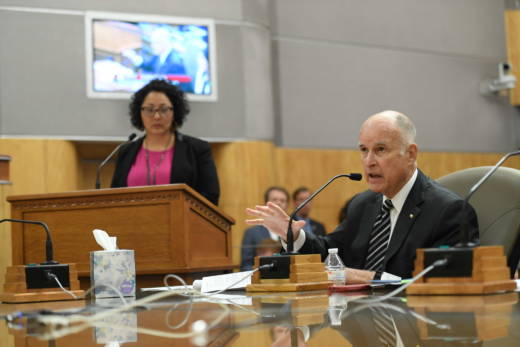Brown has spent the week trying to rally support both publicly and privately for the final version of his proposal to extend the cap-and-trade program. Before Thursday's committee hearing, Brown made his pitch in a meeting with Assembly Democrats.
The main legislation to extend cap and trade, Assembly Bill 398, requires a two-thirds vote, meaning Brown can't afford to lose Democratic votes in either house, unless Republicans sign on.
Republicans Announce Opposition
The possibility of a bipartisan agreement took a hit on Thursday morning, when Assembly Republican Leader Chad Mayes announced that members of his caucus, who had previously signaled some support for an extension, were against the proposal.
"There are no Assembly Republican votes for the cap-and-trade deal in its current form," said Mayes, R-Yucca Valley, in a statement. "We will not support a deal that doesn’t cut taxes, roll back regulations and protect ordinary Californians."
Republican Senate Leader Pat Bates also announced the opposition of her caucus in a letter to the governor, although GOP Sens. Tom Berryhill, R-Modesto, and Anthony Cannella, R-Ceres, did not sign their names.
Brown told the two Republican senators on the Environmental Quality Committee, Ted Gaines, R-El Dorado, and Jeff Stone, R-Riverside County, that the alternative to cap and trade would be much worse.
In that scenario, called "command and control," the California Air Resources Board could mandate specific emission cuts from companies in order to meet the state's overall emissions reduction goal.
“The ARB will regulate the food processing, the oil industry, the cement industry in a way that is not efficient, that will be three to five times more costly," Brown said. "Yes, that will be noticed by your constituents.”
Gaines said potential increases in the gasoline prices under cap and trade could amount to "a regressive tax on the poor in California."
Local Air Districts Voice Concerns
While Republicans on the committee criticized potential costs on consumers, expert witnesses and dozens of speakers told the committee the plan isn't tough enough on local polluters.
Local air districts and members of the environmental justice community have focused on a provision in the plan that bars local air regulators from joining the state in limiting carbon dioxide emissions from factories and refineries.
“We believe that as long as it’s done consistently and in support of the overall program, the air districts ought to be a part of regulating greenhouse gases from these sources," said Jack Broadbent, CEO of the Bay Area Air Quality Management District.
The BAAQMD has been working on its own plan to regulate CO2 emissions from local oil refineries. Business groups have said that local regulators should focus on local pollutants, not greenhouse gases.
Local air quality is addressed in Assembly Bill 617, which was also approved by the Senate committee on Thursday. Many Democratic lawmakers wanted a cap-and-trade extension to come with a focus on pollutants that disproportionately impact poorer neighborhoods in the state.
"What I'm talking about is making sure that we show the world that we can take care of our global community, but that we're not going to do it at the expense of our own communities," said Assemblywoman Cristina Garcia. The Los Angeles Democrat is carrying AB 617.
Brown took notes as speakers came forward to express environmental concerns about the cap-and-trade plan. Garcia promised that the work to reduce local air pollution would continue beyond this deal.
“This is a down payment and not all that we need to be doing,” she said.
The two bills now move the Senate Appropriations Committee, which will take them up on Monday morning, before an expected afternoon floor vote in both houses.
The legislation does not detail how all the money from the state's cap-and-trade auctions (where businesses purchase the credits that allow them to release emissions) would be spent. A piece of the fund would go toward backfilling the state fire prevention fee, which AB 398 eliminates. The fee is paid mostly by rural residents, and is very unpopular among Republican lawmakers.
The funding could also be used to woo individual lawmakers or to address the state's housing affordability crisis, a top priority for many legislative Democrats.
